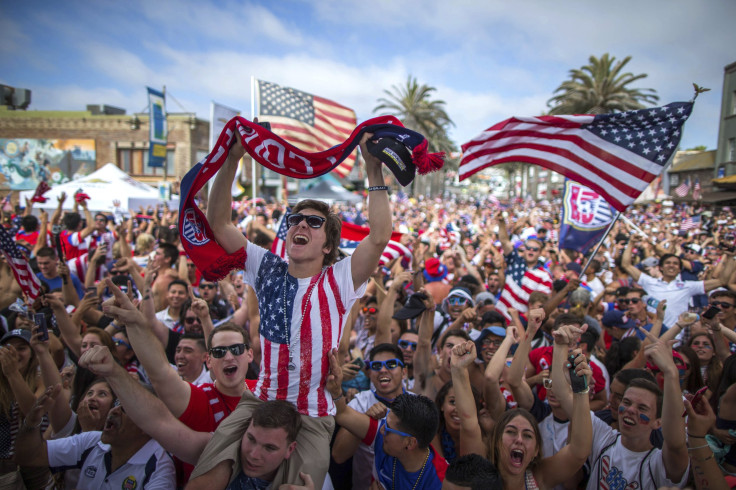John Brooks' Goal: USA World Cup Win Over Ghana Pays Off For ESPN And Sponsors

When John Brooks headed in a late goal against Ghana Monday night, he didn’t secure just a glorious win for the much-maligned U.S. team. He also brought an early payout to companies who had bet that Americans would finally start to share the rest of the planet’s passion for the World Cup.
The Ghana-USA game drew a 7.0 overnight rating on ESPN, the highest ever for any World Cup match broadcast on ESPN or ESPN2, according to Deadline. The sports merchandising website Fanatics.com said it saw a 300 percent spike in sales of Team USA gear Monday, making the team the highest seller on the site for the day. (Good news for Nike.) And there were more than 3 million tweets sent out about the game on Monday, according to Melissa Latham, senior account executive at the Boston-area public relations and social media firm Matter Communications.
The amount of money involved in a World Cup or Olympics is staggering.
“Considering the fact that Visa spent [about] $860,000,000 in 2008 on sponsorship of the Olympics alone, I’ll say billions [of dollars are riding on American interest in the World Cup],” Timothy Frie, leading director and co-founder of the Tampa-area strategic branding agency Frie & Co, wrote via email. “Remember that this isn’t just a win -- it’s something much bigger. You have hundreds of millions of people that are having a serious emotional response to this event. It’s worth more than just a smile and a cheer -- it’s a legendary occurrence."
Numerous companies gleefully predicted that Brooks’ goal will help catapult soccer to the upper echelons of American sport, as Team USA’s 1980 “miracle on ice” win over Russia in the Olympics did for hockey.
“When they won the gold, you saw a surge in interest in hockey and marketing with hockey in the U.S., and you’re going see the same now with soccer,” said David Johnson, CEO of Strategic Vision, an Atlanta public relations and branding agency. “The ratings were up last night and they’re going to continue to be up, I anticipate. People are going to be very enthusiastic about soccer and your marketers and advertisers are going to tap into this.”
On Monday, Century 21 Real Estate re-signed for two more years as the official real estate company of U.S. Soccer, according to the Wall Street Journal. The move is an example of the fast-shifting nature of sports business. Lisa Bamford, director of branded content at the public relations and marketing firm FletcherPR, thinks brands will scramble to capitalize on soccer’s cachet.
“In America, our big corporations and businesses are quick responders,” Bamford wrote via email. “If they see even a potential of a trend to hit it big with consumers, they are going to act immediately. And this really comes into play with the sports world.”
Soccer has gradually taken on a more prominent role in American sports and culture. First came the launch of Major League Soccer in 1996. The TV audience for the World Cup increased by 19 percent between the 2006 and 2010, the biggest jump of any market considered by the Fédération Internationale de Football Association. Soccer is a popular sport for U.S. kids, but only 2 percent of Americans said men’s soccer was their favorite sport last year, according to the Harris Poll. And some observers believe that any spike in interest during the World Cup will be temporary.
The World Cup is a unique moment that’s attractive for advertisers right now, said Mike Sprouse, president & CEO of Sprouse Marketing Group in Chicago. But American interest will be fleeting, and therefore not the best investment.
“Bottom line is yes, the spike is happening and most marketers feel that the World Cup craze is well worth the investment,” he wrote via email. “The captive and enormous audience is unavoidable for this period of time. For some global marketers, it is like the Super Bowl over and over again for 30 days.”
The USA-Ghana game may also be the American team’s high point. Vassilis Dalakas, a marketing professor at California State San Marcos, feels that too much is riding on how well the team does for a large marketing investment to make sense at this point.
“Unfortunately, losses in the next two games against tough opponents like Portugal and Germany can mean a big drop in the popularity of the team and consequently, short-lived gains for the advertisers and sponsors but also for the popularity of soccer as a sport in America,” he wrote via email.
Greg Smith, chief creative officer at Portland, Maine-based VIA Agency advertising firm -- which represents brands like Sam's Club, Perdue and Samsung and has experience in sports advertising -- is even more bearish on soccer’s staying power.
“The World Cup is like a novelty. In the U.S., if you ask the average consumer if they can name five guys on the U.S. team I bet they couldn’t,” he said.
“I’m not a psychic but I will say that I think soccer has a long way to go for North American brands to get totally invested in. To be honest with you, the minicamp for the NFL opens in July -- and I don’t think anyone will be talking about soccer even then.”
© Copyright IBTimes 2024. All rights reserved.





















